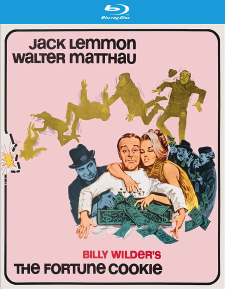Fortune Cookie, The (Blu-ray Review)

Director
Billy WilderRelease Date(s)
1966 (August 17, 2021)Studio(s)
United Artists/MGM (Kino Lorber Studio Classics)- Film/Program Grade: B+
- Video Grade: B+
- Audio Grade: B+
- Extras Grade: B
Review
The Fortune Cookie was the seventh collaboration between writer/director Billy Wilder and co-writer I.A.L. Diamond, and the fourth time that they had worked with Jack Lemmon. But it added a crucial new wrinkle: paring Lemmon with Walter Matthau. The film isn’t necessarily as well-regarded as some other Lemmon/Matthau projects, but the combination of the two along with Wilder and Diamond couldn’t help but produce some sparks. It didn’t hurt that both actors were playing squarely according to type, with Lemmon at his most nebbish, and Matthau at his oiliest and most cynical. While both of them were more than capable of playing a broad range of roles, it’s the contrast between their essential personas which made them so effective as a team.
Harry Hinkle (Lemmon) is a CBS sports cameraman who is injured during a Cleveland Browns game when “Boom Boom” Jackson (Ron Rich) accidentally runs into him at the end of a play. While his injuries are minor, his ambulance-chasing brother-in-law lawyer Willie Gingrich (Matthau) convinces him to pretend that he’s partially paralyzed so that they can bilk a huge settlement out of the insurance company. But with private eye Chester Purkey (Cliff Osmond) on the case, Hinkle’s wife Sandy (Judi West) having an agenda of her own, and Hinkle being wracked with guilt about taking advantage of the good-natured Jackson, will the scheme pay off?
The Fortune Cookie was a return to safer territory for Wilder and Diamond after the unfairly negative reaction to their previous film Kiss Me Stupid, and that move paid off with four Academy Award nominations including one for their script. Walter Matthau walked off with his first and only Oscar, for Supporting Actor. (He would be nominated again for Kotch and The Sunshine Boys, but ended up empty-handed both times.) Cynicism was Wilder’s stock and trade, and The Fortune Cookie delivered that in spades.
Cinematographer Joseph LaShelle shot The Fortune Cookie on 35 mm film with anamorphic lenses, framed at 2.35:1 for its theatrical release. Like Lilies of the Field, this new Kino Lorber edition of The Fortune Cookie appears to be using the same master as the previous Twilight Time version. Despite being an older transfer, it’s still in satisfactory shape with only a few minor issues. The grayscale is good, with a nice contrast range and deep black levels. There are no visible signs of digital cleanup, so there’s plenty of fine detail in textures such as the costumes, and the grain is intact. There’s some light damage like speckling and a few scratches, but that’s an acceptable trade-off from the lack of DNR—it’s better to have some fleeting damage than to lose the detail.
Audio is offered in English 2.0 Mono DTS-HD Master Audio, with optional English subtitles. The track is clean and well-balanced, with clear dialogue and a memorable score by Andre Previn.
Extras include the following:
- Audio Commentary by Joseph McBride
- Call for Extras: Jack Lemmon Asks the Good People of Cleveland to Show up at Municipal Stadium (SD – :59)
- Tribute to I.A.L. Diamond (SD – 2:08)
- Scene Work with Jack Lemmon and Walter Matthau (SD – 3:37)
- Trailers from Hell with Chris Wilkinson (HD – 2:55)
- Trailer (HD – 2:37)
- Irma la Douce Trailer (SD – 3:53)
- Avanti! Trailer (SD – 2:39)
- The Front Page Trailer (SD – 2:37)
- The Laughing Policemen Trailer (HD – 3:36)
- The Taking of Pelham One Two Three Trailer (HD – 2:33)
- Fitzwilly Trailer (SD – 2:33)
Film Historian Joseph McBride has as new book about Wilder called Billy Wilder: Dancing on the Edge, so it’s perfect timing for him to be doing a commentary track on The Fortune Cookie. He doesn’t consider the film to be one of Wilder’s best, but he does feel that it’s important thematically. He talks about those themes, including ones that he finds regressive (such as the way that the film handles racial issues). He also addresses accusations of misogyny in Wilder’s work, describing Wilder as more of a disappointed romantic, with female characters who are neither fully good nor fully bad. He does feel that there are issues with The Fortune Cookie due to the fact that Wilder and Diamond were stung by the hostile reaction to Kiss Me Stupid, so they were too cautious when addressing sexuality in this film, and as a result the female characters are a bit more one-dimensional. McBride also spends time on biographical details about Wilder, his relationship with Diamond, and various facts about the production of the film.
Call for Extras is a promotional clip that Lemmon did for television to encourage Cleveland residents to show up at Municipal Stadium to serve as extras in the film. The Tribute to I.A.L. Diamond is a brief clip of Wilder reminiscing about Diamond. Scene Work is effectively another tribute to Diamond, where Wilder stages a sketch from Diamond’s student days. In the Trailers from Hell, Wilkinson points out that The Fortune Cookie was Matthau’s favorite collaboration with Lemmon, and notes that for all the flaws that the film does have, it’s worth the price of admission to see the pair at the top of their games. Missing extras from the previous Twilight Time edition include an isolated score track and the booklet with an essay by Julie Kirgo.
Even if it’s true that The Fortune Cookie isn’t one of Wilder’s best films—and that’s a debatable point—lesser Billy Wilder is still major filmmaking. It belongs in the collection of any fan of his work.
- Stephen Bjork
(You can follow Stephen on Facebook at this link)

